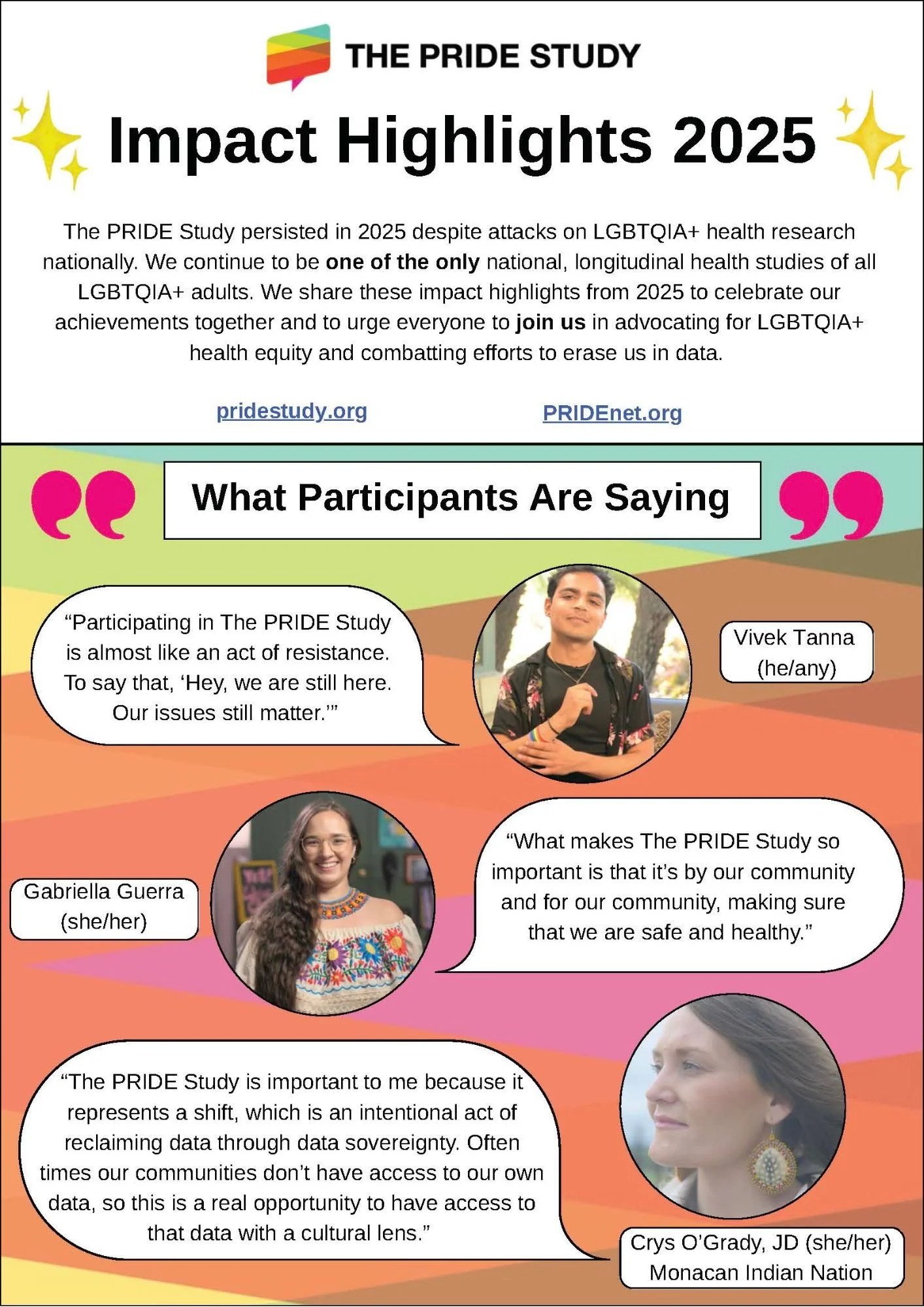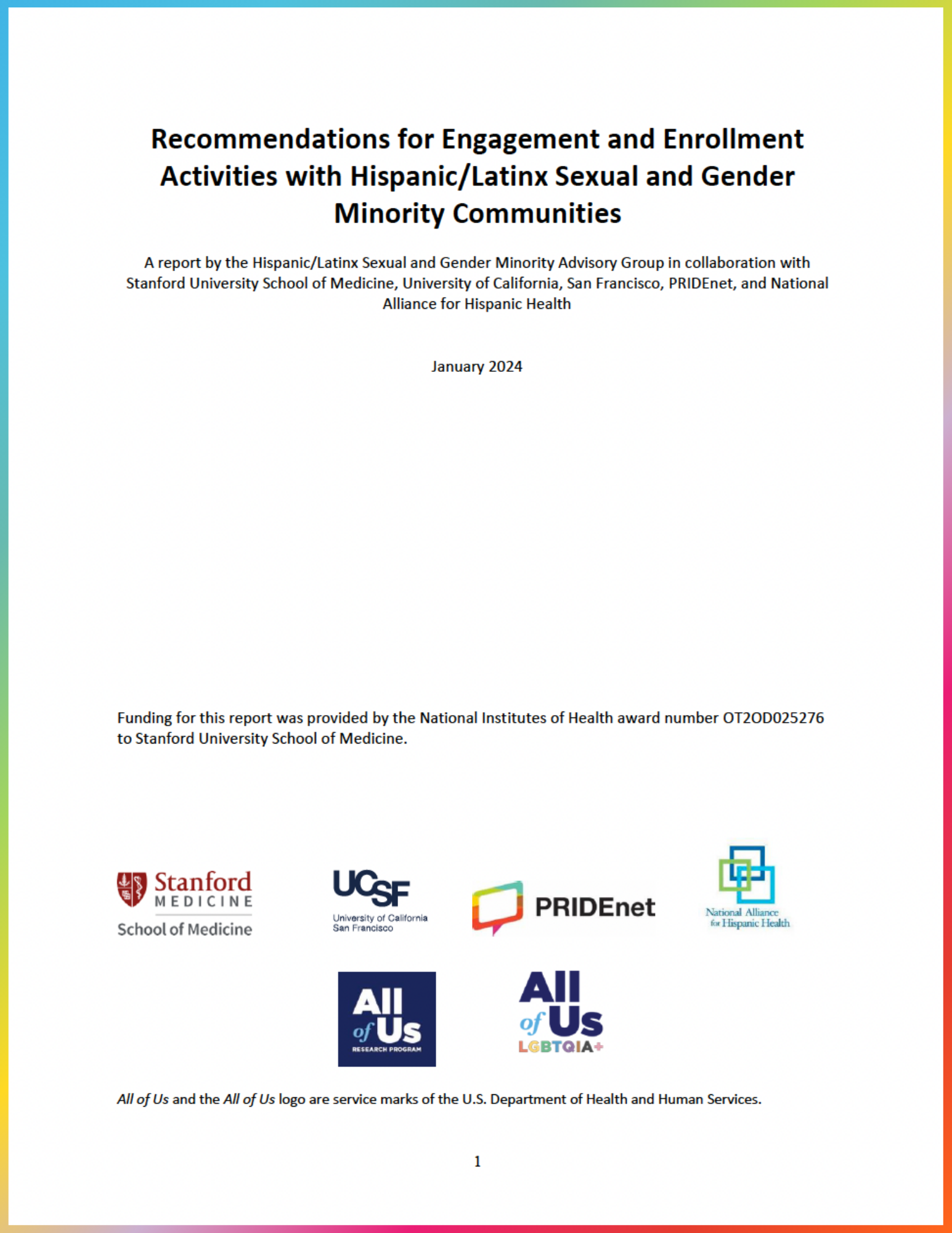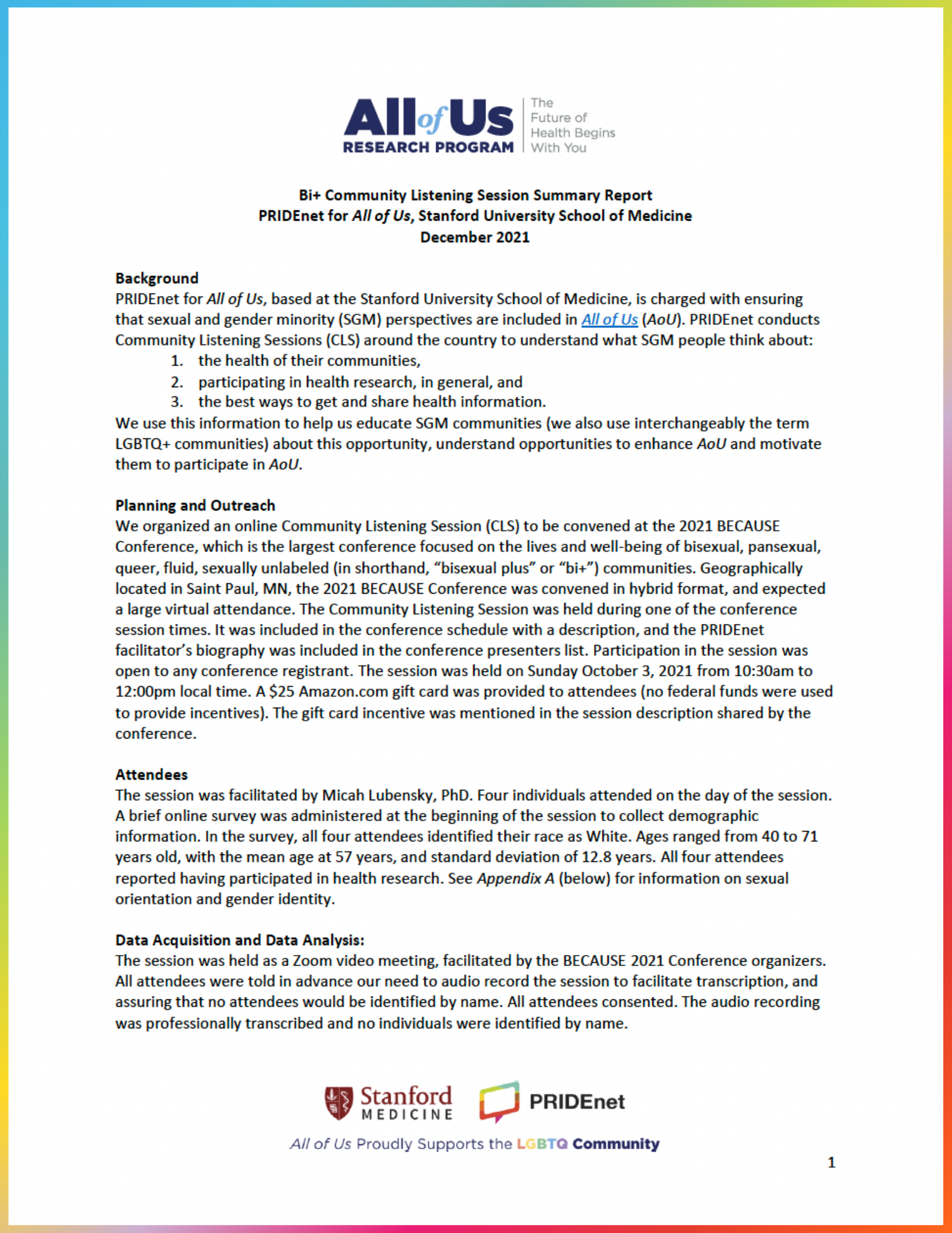Reports
Overview
2026
The PRIDE Study 2025 Impact Highlights — January 2026
2025
The PRIDE Study 2024 Impact Report — January 2025
2024
Stronger Together: A Guide for Empowering Inclusion of Sexual and Gender Minority People at Blood Centers — November 2024
Community Listening Sessions with LGBTQIA+ Adults 50 Years and Older: Summary Report — July 2024
Recommendations for Engagement and Enrollment Activities with People Living with a Disability Sexual and Gender Minority Communities — March 2024
Recommendations for Engagement and Enrollment Activities with Hispanic/Latinx Sexual and Gender Minority Communities — January 2024
Community Listening Sessions with Aromantic People: Summary and Recommendations Report — January 2024
2023
Recommendations for Engagement and Enrollment Activities with Asian American, Native Hawaiian, and Pacific Islander Sexual and Gender Minority Communities — November 2023
Recommendations for Engagement and Enrollment Activities with African American Sexual and Gender Minority — November 2023
Engaging Sexual and Gender Minority (SGM) Populations in Biomedical Research at U.S. Blood Banks — February 2023
Communities Community Listening Sessions with Intersex Persons: Summary Report — February 2023
2021
Bi+ Community Listening Session Report — December 2021
2020
Report on 13 Health Research Community Listening Sessions (CLS) with Sexual and Gender Minority (SGM) People Across the Country — December 2021
Read the Reports
The PRIDE Study 2025 Impact Highlights
January 2026
The PRIDE Study persisted in 2025 despite attacks on LGBTQIA+ health research nationally. We continue to be one of the only national, longitudinal health studies of all LGBTQIA+ adults. We share these impact highlights from 2025 to celebrate our achievements together and to urge everyone to join us in advocating for LGBTQIA+ health equity and combatting efforts to erase us in data.
The PRIDE Study 2024 Impact Report
January 2025
This report shines a light on the powerful accomplishments that we have made across research, community engagement, communications, and innovation – all in the name of advancing LGBTQIA+ health. It holds our key goals for The PRIDE Study and where we hope to be by our 10th anniversary (of the 2017 web-based launch) in 2027. We invite you to read our Impact Report to see where we are headed and how you can help us reach these goals.
Read the report:
Stronger Together: A Guide for Empowering Inclusion of Sexual and Gender Minority People at Blood Centers
November 2024
This guide offers practical strategies for blood centers to build trust and improve outreach with sexual and gender minority (SGM) communities, aiming to increase inclusivity and participation in blood donation and research participation. It complements the report Engaging Sexual and Gender Minority (SGM) Populations in Biomedical Research at U.S. Blood Banks by providing actionable recommendations for fostering welcoming environments and stronger community partnerships. These insights are valuable for blood centers and SGM organizations alike in advancing equity and engagement.
Community Listening Sessions with LGBTQIA+ Adults 50 Years and Older: Summary Report
July 2024
Together with PRIDEnet’s Community Partner Consortium member Equitas Health Institute, we collaborated on three (3) community listening sessions with LGBTQIA+ older adults. We listened to their experiences with and attitudes towards health research engagement and participation, health concerns and solutions, and community building and social support. This report illuminates the challenges and barriers discussed by the session participants, as well as illustrates the joys of aging and the participants' unwavering advocacy that is shaping our present and future.
Recommendations for Engagement and Enrollment Activities with People Living with a Disability Sexual and Gender Minority Communities
March 2024
PRIDEnet recognizes that LGBTQIA+ people span across all demographic groups and that LGBTQIA+ community members’ layered identities all play a role in their health experiences. People living with a disability who are also LGBTQIA+ have a diverse range of experiences and strengths, and they face unique barriers when it comes to health and research participation. PRIDEnet collaborated with the American Association on Health and Disability to create a People Living with a Disability Sexual and Gender Minority (SGM) Advisory Group to collaborate directly with the community to develop recommendations for engagement and enrollment strategies that are more inclusive and responsive for this community.
Recommendations for Engagement and Enrollment Activities with Hispanic/Latinx Sexual and Gender Minority Communities
January 2024
PRIDEnet recognizes that LGBTQIA+ people span across all demographic groups and that LGBTQIA+ community members’ layered identities all play a role in their health experiences. Hispanic/Latinx community members who are also LGBTQIA+ have a diverse range of experiences and strengths, and they face unique barriers when it comes to health and research participation. PRIDEnet collaborated with the National Alliance for Hispanic Health to create a Hispanic/Latinx Sexual and Gender Minority (SGM) Advisory Group to collaborate directly with the community to develop recommendations for engagement and enrollment strategies that are more inclusive and responsive for this community.
Community Listening Sessions with Aromantic People: Summary and Recommendations Report
January 2024
Recognizing the need for more affirming research related to aromantic and aromantic-spectrum communities, PRIDEnet reached out to AUREA to explore collaboration in the design and implementation of community listening sessions that would address the lack of information surrounding the social, mental, and physical health of aromantic people and help us understand the challenges faced by and the resilience of the aromatic community.
Recommendations for Engagement and Enrollment Activities with Asian American, Native Hawaiian, and Pacific Islander Sexual and Gender Minority Communities
November 2023
PRIDEnet recognizes that LGBTQIA+ people span across all demographic groups and that LGBTQIA+ community members’ layered identities all play a role in their health experiences. Asian American, Native Hawaiian, and Pacific Islander (AANHPI) community members who are also LGBTQIA+ have a diverse range of experiences and strengths, and they face unique barriers when it comes to health and research participation. PRIDEnet collaborated with the Asian Health Coalition to create an AANHPI Sexual and Gender Minority (SGM) Advisory Group to collaborate directly with the community to develop recommendations for engagement and enrollment strategies that are more inclusive and responsive for this community.
Recommendations for Engagement and Enrollment Activities with African American Sexual and Gender Minority Communities
November 2023
PRIDEnet recognizes that LGBTQIA+ people span across all demographic groups and that LGBTQIA+ community members’ layered identities all play a role in their health experiences. African American community members who are also LGBTQIA+ have a diverse range of experiences and strengths, and they face unique barriers when it comes to health and research participation. PRIDEnet collaborated with the Delta Research and Educational Foundation to create an African American Sexual and Gender Minority (SGM) Advisory Group to collaborate directly with the community to develop recommendations for engagement and enrollment strategies that are more inclusive and responsive for this community.
Engaging Sexual and Gender Minority (SGM) Populations in Biomedical Research at U.S. Blood Banks
February 2023
To address the impacts of FDA blood donor policies on sexual and gender minority (SGM) communities, PRIDEnet conducted community listening sessions with SGM individuals and blood bank staff involved in the All of Us Research Program. These sessions aimed to capture SGM perspectives on exclusionary policies, as well as experiences within blood donation settings, to inform more inclusive practices. Findings highlight the need for trust-building and healing-centered approaches, with recommendations to engage SGM communities, elevate marginalized voices, and create affirming environments at blood banks.
Community Listening Sessions with Intersex Persons: Summary Report
February 2023
PRIDEnet collaborated with interACT Advocates for Intersex Youth to conduct community listening sessions that would help shine a light on the unique health care and health research experiences of intersex persons and people with intersex traits.
Bi+ Community Listening Session Report
December 2021
PRIDEnet organized an online community listening session convened at the 2021 BECAUSE Conference, which is the largest conference focused on the lives and well-being of bisexual, pansexual, queer, fluid, sexually unlabeled (in shorthand, “bisexual plus” or “bi+”) communities.
Report on 13 Health Research Community Listening Sessions (CLS) with Sexual and Gender Minority (SGM) People Across the Country
March 2020
PRIDEnet conducted 13 community listening sessions (CLS) with LGBTQIA+ communities across the country. Sessions were conducted both in-person and online. CLS conversations focused on health care concerns, research participation, and communication preferences. The voices captured in the report will help the All of Us Research Program better understand common experiences and perspectives, as well as unique issues within specific sub-communities as we continue to build the warm, welcoming, and respectful research program we all envision for our underrepresented communities.













